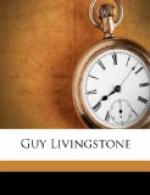“That she might go mad or die,” was the quick answer: it came from Flora Bellasys.
“How good of you,” Guy said, “to let me finish that long story, when you knew it by heart.”
I think no ear but his and mine caught the whisper—“I never read or heard of it till now.”
He bent his head in assent, as if the intelligence did not surprise him much, and then spoke suddenly,
“Charley, will you make an observation? You have been displaying that incontestable talent of yours for silence long enough.”
Very seldom was Forrester taken by surprise, but this time his reply was not ready. There was an embarrassing pause, broken by a Deus ex machina,—the butler announcing that Mr. Bruce had arrived, and was in the drawing-room.
CHAPTER XI.
“And now thou
knowest thy father’s will,
All that
thy sex hath need to know:
’Twas mine to
teach obedience still—
The way
to love thy lord may show.”
From that dark distant corner I heard a sigh, ending in a nervous catching of the breath, and then a muttered word unpleasantly like an oath, as Forrester sprang to his feet.
Livingstone rose slowly.
“I’ll go and receive him. Let Mr. Raymond know, Wise. I suppose he will not care to see any one else before dressing-time; it must be near that now.”
As he passed his cousin, he whispered something inaudible to us; and I saw his heavy hand fall on Charley’s shoulder, crushing him down again like a child.
Then Flora went to Miss Raymond, and asked her, with more kindness in her manner than usual, to come to her rooms for some tea; they always seriously inclined to the consumption of that cheerful herb about this hour. Isabel clung to her companion as they went out with a meek helplessness which was sad to see.
Charley had vanished before them. After that first involuntary movement he had become nonchalant as ever, so I remained alone to ruminate. I confess, after some thought, I was still in the dark as to where things would end.
The meeting had been got over somehow, for, when I came down before dinner, Bruce was sitting on a sofa by Miss Raymond’s side.
Why does a man in such a position invariably look as if he were on the stool of repentance, expiating some misdeed of unutterable shame? He has sat by the same woman before, when it was only a strong flirtation; more eyes, curious and spiteful, were upon him then, and he met them with perfect self-possession. Now that he is in his right, why does he look blushingly uneasy, as if he would call on the curtains to hide him, and the cushions to cover him? Have any mortals existed so good, or great, or wise, as to be exempt from that dreadful poll-tax levied on all males unprivileged to woo by proxy—the necessity of looking ridiculous from the moment their engagement is announced to that when they leave the church as Benedicts? I should like to have watched Burke, or Herschel, or the Iron Duke, or any Archbishop of Canterbury, through the ordeal of a recognized courtship. Would the dignity of the statesman, the sage, the soldier, or the saint have been sustained? I trow not.




